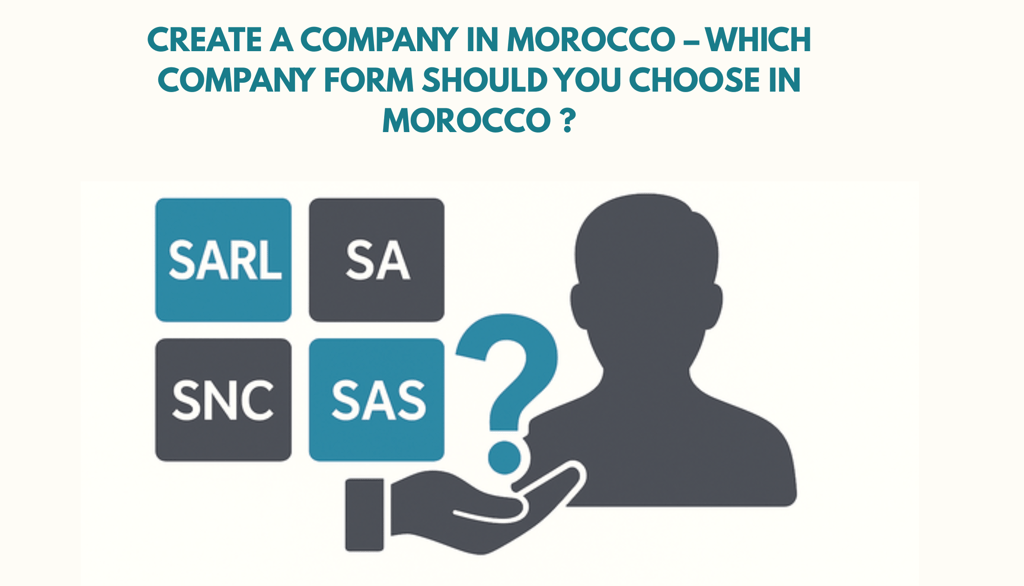Create a Company in Morocco – Which Company Form Should You Choose in Morocco?
Discover the key differences between LLC, SAS, SA, SCI, and more to help you choose the right legal form in Morocco. Practical guide.
6/2/20253 min read


Why the Choice of Legal Structure Is Crucial
Creating a business is like drawing the blueprints for a building. If the foundation is poorly designed, everything else will be unstable. The choice of legal structure determines the tax, social, and decision-making framework of your activity. It's a foundational choice, not just a formality.
On one hand, there's the tax regime: will you be subject to IR (Income Tax) or IS (Corporate Tax)? Will your compensation be a salary or dividends? On the other, social security coverage: will you be affiliated with the CNSS? Finally, governance: who makes decisions? Who has oversight? Who is liable for the company's actions?
And since every project is unique, every structure should be as well. A freelancer, a tech startup, a family group, or a real estate investor don't have the same constraints or ambitions.
The Most Common Legal Structures in Morocco
The SARL - Simplicity and Flexibility for VSEs/SMEs
This is the star of legal structures in Morocco. Accessible, flexible, and reassuring. The SARL (Limited Liability Company) can be created by a single person (SARL-AU) or by up to 50 partners. There's no need for a large capital, liability is limited to contributions, and management remains flexible.
In terms of taxation, it's subject to corporate tax. For governance, one or more managers are appointed. But be careful with the transfer of shares: it's regulated and often requires approval.
In short, the SARL checks a lot of boxes for entrepreneurs who want to move forward without too much complexity while maintaining control.
The SAS - Contractual Flexibility and Modern Image
The SAS (Simplified Joint Stock Company) is the playground for startups and entrepreneurs who love freedom. There's no minimum capital, great freedom in drafting the articles of association, and the ability to easily integrate investors.
It is led by a president, but the articles of association can provide for other bodies. It's a young, dynamic structure, but it requires good support, as statutory flexibility is a double-edged sword.
It's ideal when you want to raise funds, organize custom governance, or work with highly involved partners.
The SA - For Major Projects or Serious Fundraising
Here, we enter another dimension. The Public Company (Société Anonyme) imposes a minimum capital of 300,000 MAD, with at least five shareholders. Two forms of governance are possible: a board of directors or a management board + a supervisory board.
It's a demanding structure: mandatory statutory auditors and more rigid formalities, but it also carries a very strong credibility with institutions and investors.
It is suitable for large companies, group subsidiaries, or those who aspire to go public or make a public offer
The SCI - For Owning and Managing Real Estate
No commerce here. The SCI (Société Civile Immobilière) is for managing real estate with a patrimonial purpose. It can opt for income tax or corporate tax, depending on the chosen strategy.
It's the perfect structure for buying a property with several people, organizing a succession, or structuring rental management. But be careful: the partners are infinitely liable.
Other Less-Known but Useful Forms in Certain Cases
The SNC (General Partnership), the SCA (Partnership Limited by Shares) or SCS (Simple Partnership), or even the GIE (Economic Interest Group) are specific forms, rarely used, but sometimes valuable. When? For a specific project between trusted partners or for pooling resources between companies.
The trade-off? Often unlimited liability for the partners and a more difficult image to manage.
The Right Choice Based on Your Profile
You are starting alone? Consider the SARL-AU if you like the classic structure, or the SASU for more freedom.
You are creating with two or three people? The SARL is reassuring, the SAS is appealing.
You are investing in real estate and want to act fast? The SCI remains the king. And if you have a long-term resale logic, the corporate tax option is worth considering.
You are preparing to raise funds? SAS or SA, depending on the scale of the project and the profile of the investors.
Tips to Avoid Classic Pitfalls
First mistake: Choosing the SARL by default, without thinking.
Second: Neglecting the impact of the articles of association on governance.
Third: Starting without understanding the medium-term tax consequences.
A good piece of advice: take your time. Get professional support. And never use a randomly downloaded template for your articles of association.
Why Get Supported by an Expert?
Because it's your project. Because legal errors are costly. And because a good setup from the start will save you time, money, and peace of mind.
At Upsilon Maroc, we help you think about your project as a whole: legal, tax, social, and patrimonial. And we support you all the way to registration, with personalized follow-up and a preliminary study.
Have a doubt? A project in mind? Let's talk. A good choice today is a thousand complications avoided tomorrow.
Accounting expertise and legal assistance in Morocco.
Contact
Yatim@Upsilon-Consulting.com
+ 212 522 202 568
© 2025. All rights reserved.


